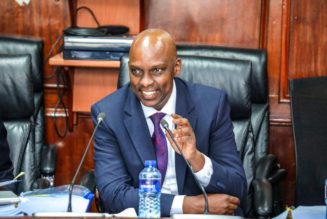Profiles
Economists: Haron Sirima had one of the toughest political jobs
Monday January 29 2024

Haron Sirima is exiting the National Treasury after running the country’s critical debt management unit for close to six years. ILLUSTRATION | JOSEPH BARASA | NMG
Haron Sirima, a soft-spoken career central banker is exiting the National Treasury after running the country’s critical debt management unit for close to six years.
The ex-Central Bank of Kenya (CBK) deputy governor confirmed his departure from the Public Service last week, coming at a time when the country is facing a repayment obligation of $2 billion Eurobond that is due in June.
President William Ruto’s public pronouncement that part of the bond estimated at $300 million will be redeemed in December, did not materialise, and instead only an interest payment of $68.7 million was effected during the period.
Read: Debt chief exits Treasury after Eurobond fallout
The idea on whether it made sense to buy back the bond however, elicited various reactions from a section of economists, with some viewing it as an opportunity for existing bondholders to cash in by raising prices to the detriment of the Kenyan taxpayers.
Dr Sirima, an economist from the University of Nairobi had been tasked with reducing the cost of borrowing and the cost of public debt management, including designing and implementing public debt management reforms such as the preparation of the legal framework for public finance management at the National Treasury.
His office is also in charge of promoting the development of the market institutions for government debt securities.
In November 2022 President Ruto said his administration would not accept borrowing money through treasury bills and bonds at rates of interest which are more than 10 percent, noting that the country’s cost of debt had become “unacceptable.
The National Treasury’s efforts to comply with the Presidential directive included the implementation of a bond switch programme by converting short-term bonds into long-term infrastructure bonds as part of the liability management operation to lower cost and risk in the domestic debt portfolio.
But the programme failed as bondholders refused to shift their Sh87.8 billion investments into a long-term infrastructure bond, dealing a major blow to the state’s grand plan of easing its financial burden.
Dr Sirima was appointed Director-General of the National Treasury’s Public Debt Management Office in June 2018 by the then-ruling Jubilee administration.
Prior to that, he had served as a deputy governor at the CBK for four years (2011-2015). He joined CBK as a graduate trainee in 1986 and rose through the ranks to the position of deputy Governor in 2011.
However, his attempt to head the apex bank failed in 2015 and the CBK board declined to renew his contract as the deputy governor.
By June last year, Kenya’s national debt had risen to a high of Sh10.27 trillion, equivalent to 70.8 percent of Gross Domestic Product (GDP) of which domestic debt stock was Sh4.83 trillion (33.3 percent of GDP) while the external debt stock was Sh5.44 trillion (37.5 percent of GDP).
Domestic and external debt stock accounted for 47.1 percent and 52.9 percent of total debt stock, respectively.
Across sections of economists said Dr Sirima’s job at the debt management office was sensitive and he did not have a free hand in making certain decisions.
“To leave voluntarily without being forced out is a great honour. His job was sensitive, no one wants to deal with debt, but someone has to, and it was Dr Sirima,” said Prof XN Iraki of the University of Nairobi’s Faculty of Business and Management Sciences.
“It’s hard to gauge his performance given the political nature of his job. Who decides how much is borrowed and from where is outside his control. And the fact that information on debt from Eurobond to Chinese loans is not that easily available. His successor will not find it easier.”
In 2019, lawmakers voted to increase the debt ceiling to Sh9 trillion, breaching the East Africa Community (EAC)’a debt target that is set at 50 percent of the GDP.
Later in June 2022, MPs voted again to increase the debt ceiling to Sh10 trillion and last year (2023) the debt ceiling was scrapped and replaced with a debt anchor at 55 percent of debt to GDP in present value terms.
The idea was to increase the government’s borrowing capacity.
“He (Sirima) was a holistic personality with good knowledge of Kenya’s macro-economic environment with good foresight in his area of operations but had no free hand in arriving at certain decisions,” said Dr Samuel Nyandemo, a senior lecturer at the University of Nairobi’s School of Economics.
The negative credit ratings from global rating agencies coupled, with fiscal constraints and macroeconomic instability continue to hurt the country’s creditworthiness.
Also read: CBK adds second deputy governor, locks out civil servants
Concerns about Kenya’s ability to repay the 2024 Eurobonds were cited by rating agency Fitch in July when it reversed the outlook on the country’s debt to negative while affirming its credit rating at B or highly speculative.









